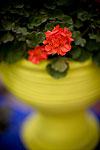 In my final look at herbs that may play a role in boosting your immunity and defending against disease, I address South African geranium and three other potentially useful natural supplements.
In my final look at herbs that may play a role in boosting your immunity and defending against disease, I address South African geranium and three other potentially useful natural supplements.
South African geranium contains both antimicrobial (infection fighting) and immunostimulatory (boost immune system) ingredients. They could increase the ability of the body’s white blood cells to eliminate the foreign invaders and also decrease the ability of bacteria to adhere to various tissues. In 2008, a meta-analysis from Germany summarizing the studies conducted from 1966 to 2007 was published. Inconsistent results were seen in three trials with 746 patients with acute bronchitis in adults and three trials with 819 children with acute bronchitis. One study on the common cold showed efficacy after 10 days, but not after five days.
These authors concluded that geranium may be effective in alleviating symptoms of acute rhino sinusitis and the common cold in adults, but better studies are needed.
The other herbs showing early evidence of some effectiveness include:
— Oscillococcinum: This is a homeopathic mixture of duck liver and heart extract. This homeopathic treatment shorted the duration of influenza by 0.28 days.
— Garlic: In a UK study, 146 healthy subjects received either placebo or a garlic supplement, once daily, for 12 weeks between the months of November and February. Results showed that those treated with garlic shortened the duration of cold symptoms from 5.01 days to 1.52 days. The incidence of colds in the garlic-treated group was reduced by over 60%.
— N-acetylcysteine: In Italy, 262 adult men and women were enrolled in a study to receive either placebo or N-acetylcysteine (600 mg twice a day) for six months. Results showed that only 25% of influenza-virus-infected subjects on N-acetylcysteine developed any influenza symptoms, as compared to 79% on placebo treatment. The protective effect of N-acetylcysteine was most pronounced in the elderly subjects.
